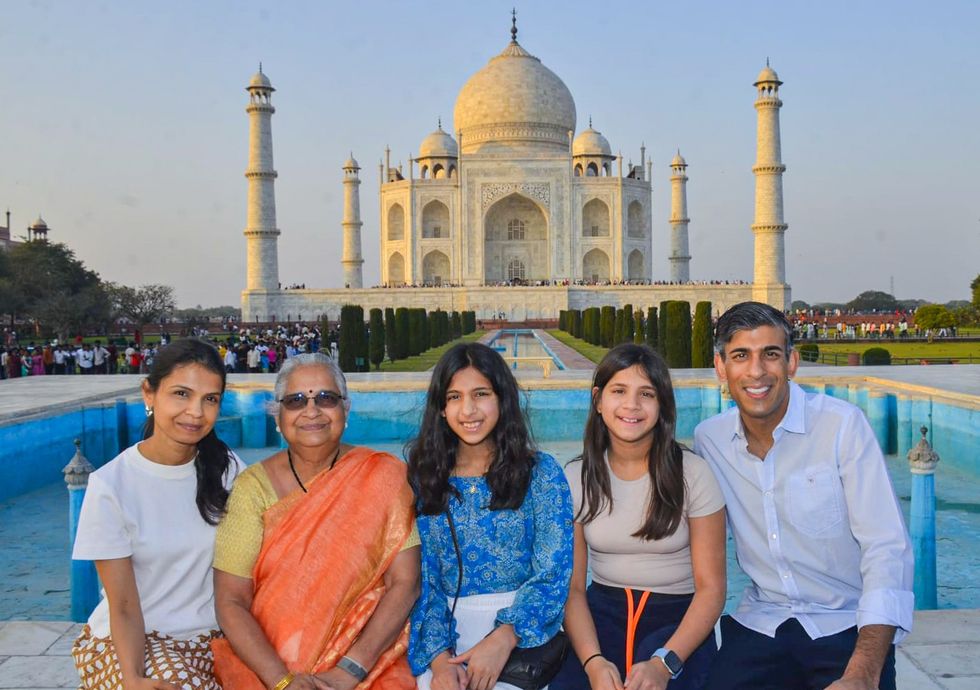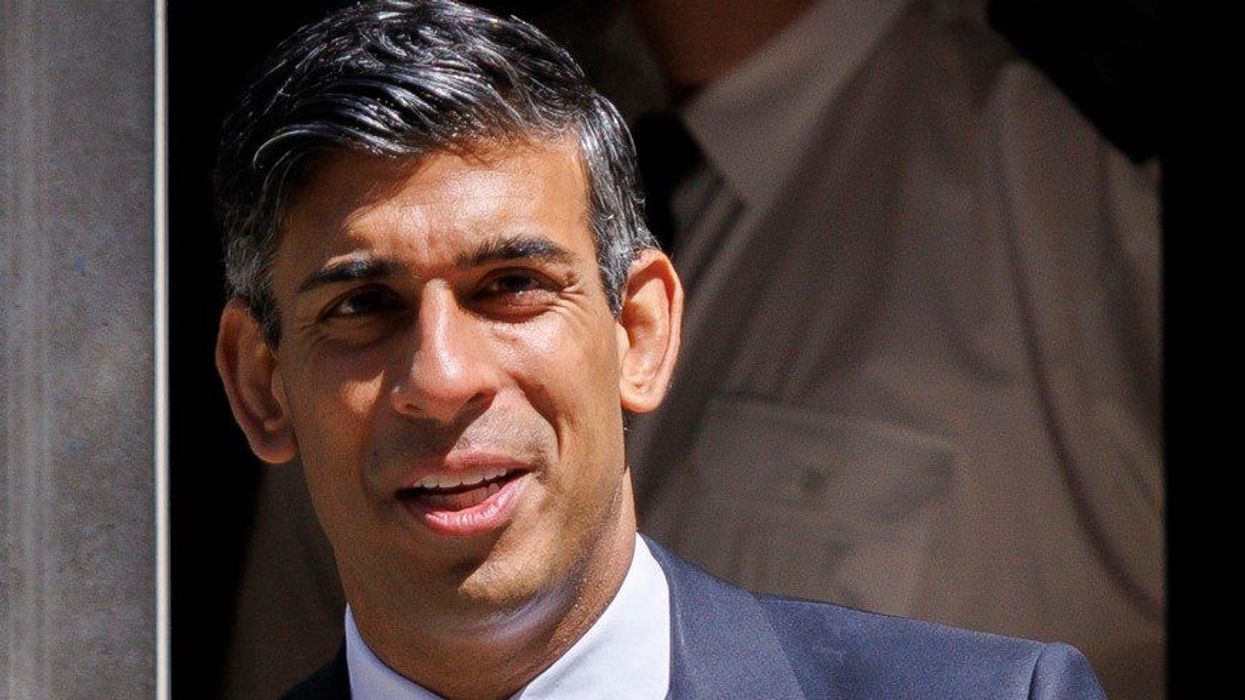FORMER prime minister Rishi Sunak has made cultural and sociological history by becoming the first prominent personality to say a brown person can be not only British, but also English.
He dismissed as “ridiculous” the suggestion from his former home secretary, Suella Braverman, that Englishness “must be rooted in ancestry, heritage, and, yes, ethnicity” – in other words, the person has to be white.
It has been acknowledged for many years that a brown or black person can be British.
Now, Sunak’s bold declaration will make it easier for the UK-born children, grandchildren and great-grandchildren of first-generation immigrants to feel they can be Hindu or Muslim, British and English – all at the same time.
In any case, more and more Britons have mixed-race origins.
The debate that Sunak has triggered may have unintended but beneficial consequences – it will probably help non-white people to feel an integral part of this country.
The discussion about Englishness initially began with a podcast discussion between Fraser Nelson, a former editor of the Spectator, and a man called Konstantin Kisin.
In an article in the Times, Nelson recognised the significance of their exchange: “Is Rishi Sunak really English? Until recently I had no idea this was a controversial question, but the debate is fast evolving amid the Trump ‘vibe shift’. The once unthinkable is being said regularly – yesterday’s taboos are becoming today’s orthodoxies. A new breed of digital discussion programmes is shaping the national conversation.
“One of the best and longest running is Triggernometry, which specialises in giving guests questions they don’t expect. I was in the chair this week and until this point had never given Sunak’s (to me, screamingly obvious) Englishness any thought.
“‘He’s a brown Hindu, how is he English?’ asked Kisin, the interviewer. ‘By being born and bred here,’ I replied. Kisin disagreed – he said that he, as a Russian immigrant, could never be English and nor could his English-born son…. I seemed to have enraged those who believe English is a term of ethnicity, nothing else, so the likes of Sunak will never – can never – become English.”
Braverman weighed in with an opinion piece in the Daily Telegraph, in which she endorsed the traditional definition of Englishness: “I was born here, raised speaking the Queen’s English, and educated in England. Yet I am not English. My parents, members of the Indian diaspora, were born in Kenya and Mauritius. They acquired British citizenship, but they were not – and could never be – considered English. For Englishness to mean something substantial, it must be rooted in ancestry, heritage, and, yes, ethnicity – not just residence or fluency.”
The former home secretary, who has positioned herself on the right of the Tory party – she has Goan roots – admitted: “I don’t feel English because I have no generational ties to English soil, no ancestral stories tied to the towns or villages of this land.”
She went on: “My heritage, with its rich cultural and racial identity, is something distinct. I am British Asian, and I feel a deep love, gratitude and loyalty to this country. But I cannot claim to be English, nor should I. This is not exclusionary – it is honest. And it’s what living in a multi-ethnic society entails.
“How many generations must pass before one can claim to be English?” she asked. “Five? Six? It is a question without an easy answer.”
The vast majority of Telegraph readers agreed: “If we are to defend Judeo-Christian civilisation, British values, and the distinctiveness of English culture, there must be some form of consensus.”

She concluded that “we – especially those of us on the Right – must stop being so squeamish about national identity. To preserve British values and English culture, we need clarity, not denial.
“We have allowed what once made England distinctive to be diluted, denigrated, and demonised. Now, more than ever, we must define what it is we are fighting for – before it slips away entirely.”
Sunak made his landmark declaration when he was asked about Braverman’s comments on the BBC’s Political Thinking podcast by journalist Nick Robinson.
This is almost certainly the first time someone prominent in public life has redefined Englishness.
Sunak, 44, born in Southampton of Punjabi parents who came from Kenya, said: “I mean, of course I’m English. (I was) born here, brought up here, yeah, of course I’m English. Actually, funnily enough, I think when we were doing that first one of these (inter[1]views) some time back, you asked about the Tebbit test.”
The Tory politician Norman Tebbit had said: “A large proportion of Britain’s Asian population fail to pass the cricket test. Which side do they cheer for? It’s an interesting test. Are you still harking back to where you came from or where you are?”
It so happens that last Sunday (9), around 1,000 people, almost exclusively of Indian origin, gathered in Queensbury in northwest London to celebrate India’s victory in the Champions Trophy cricket final in Dubai.
Sunak continued: “It struck me, actually, this debate, it kind of moves well beyond that, because it is not enough just to support England at cricket. It turns out it may not be enough to even play for England in cricket or football. You still can’t be English. You look at the composition of our England cricket team, England football team.
“On this definition (by Braverman), you can’t be English even playing for England, let alone supporting them. So I found the whole thing slightly ridiculous.”
“Mad?” suggested Robinson. “I genuinely thought it was ridiculous. Of course, I’m English.”
“Why is this being debated, do you think, because it is?” asked the presenter.
“It’s beyond me, but, as I said, I find it ridiculous,” remarked Sunak.
Robinson prompted the former prime minister to finished off his sentence: “For the record, Rishi Sunak is…”
“English,” said Sunak.
“And proud of it,” said Robinson. Sathnam Sanghera, author the book, Empireland, rejected Braverman’s thesis: “This is the logical conclusion to her deranged, racist politics and the open sewer of our current discourse. A race now, I guess, for the first brown Tory to deport themselves to a country they don’t know.”
The historian Dan Snow poked fun at Braverman by referring to a King of England who had lived most of his life in France: “Someone needs to ask her whether Richard the Lionheart was English.”
In the Observer, columnist Keenan Malik said ideas of race and ethnicity had become conflated.
He wrote: “‘They think they’re English because they’re born here. That means if a dog’s born in a stable it’s a horse.’ That was a staple of the comedian Bernard Manning’s routine back in the 1970s.
“Enoch Powell had, a decade earlier, expressed the same sentiment in more refined language: ‘The West Indian or Asian does not, by being born in England, become an Englishman. In law he becomes a United Kingdom citizen by birth; in fact he is a West Indian or an Asian still.’
“Few today would laugh along with Manning or take seriously the claim that only white people can be English. Britain has transformed over the past half-century, and most English people now embrace Ian Wright and Idris Elba as being as English as David Beckham or Joanna Lumley.”
In an article in the Daily Telegraph, “How English are you?”, Iain Hollingshead quoted Prof John Denham, a former Labour MP and now the director of the Centre for English Identity and Politics at the University of Southampton.
Denham told the paper: “Braverman has a particular view – it’s not what most people feel, but she’s perfectly entitled to feel it. And she has something important to say, which is that national identity is more than a passport and that it includes some sense of history, belonging and values.
“Ethnicity properly understood is about all the history and values which go towards making a national identity. Braverman makes the classic confusion of reducing ethnicity to a narrow question of race.”
“Ten years ago, it looked as though there was an upsurge in people identifying primarily as English,” Denham explained.
“Now, there’s a more subtle shift towards people identifying as both English and British. Having a strong English identity is highly associated with a sense of patriotism – and being patriotic about both England and Britain. When you ask people about what values they associate with Englishness and Britishness, there’s very little difference on values such as tolerance or sense of humour.
“However, strong Englishness identifiers tend to be associated with much more positive values than those who identify simply as British. So, the degree of patriotism is the key distinguisher.”
The paper said Robert Jenrick, the shadow justice secretary, “tried to champion ‘our existing identity with passion’ before drying up on Sky News when asked to explain English identity. In a subsequent radio interview, he resorted to clichés about landscapes, literature and Sunday roasts.”
In the Financial Times, columnist Robert Shrimsley said Braverman “bellowed out sort-ofalien status as she curried favour with the ethno-nationalists of the populist right”.
Shrimsley recalled: “It brought back a decades-old memory of a discussion with an ex-colleague, who explained that as the grandson of Polish Jewish immigrants, I was not English. It didn’t matter, he handsomely reassured me, since I was British.
“Culturally, I was very English. I am indisputably a Londoner and I passed what was known as the cricket test espoused by former Tory chairman Norman Tebbit, in that I cheered for England in sporting events. …. Mind you, we have all witnessed the backlash against black footballers if they fail on the national stage.”
He warned the debate “ought to be a concern to everyone. After all, if there’s no evidence God was born here, can we still claim he’s an Englishman? He’d be a British deity at best. It gets worse. Was Churchill English? His mother was an American of French Huguenot descent. And as for the King, wasn’t his father Greek?
“This may sound facetious, but if political discourse is moving to a place that attempts to deny belonging to people born here and place it only in the hands of a purer class of citizens, it begins to matter quite a lot. Like many people of immigrant descent, I feel intensely patriotic, proud of my country, defensive of its laws and traditions, and devoted to Winnie the Pooh. Once, that seemed enough.”
Sunak will go down in history as Britain’s first Indian and Hindu prime minister. But he will probably also be remembered in years to come for widening the definition of Englishness.




